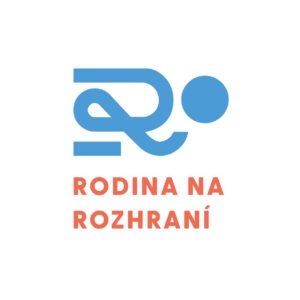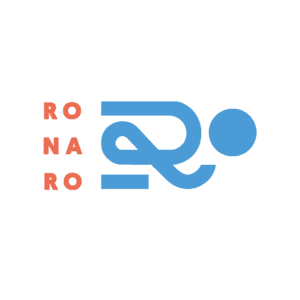transnacionálnej rodiny
Family on the Edge: Current Contexts of Vulnerability and Transnational Family Transformations
Grant Scheme: APVV
Project Number: VV-MVP-24-0203
Project Title: Family on the Edge: Current Contexts of Vulnerability and Transnational Family Transformations
Acronym: RONARO
Duration: March 1, 2025 – December 31, 2028
Partner Institution: The Institute for Research in Social Communication at SAS
Principal Investigator: Mgr. Martina Wilsch, PhD.
Project Team:
Mgr. Soňa Gyárfáš Lutherová, PhD., IESA SAS
Mgr. Ľubica Voľanská, PhD., IESA SAS
Mgr. Miroslava Hlinčíková, PhD., IESA SAS
Mgr. Zuzana Očenášová, PhD., IRSC SAS
Mgr. Magdaléna Petrjánošová, PhD., IRSC SAS
doc. Mgr. Miroslav Popper, CSc., IRSC SAS
The research project’s central theme is the vulnerability of transnational families (Bryceson & Vuorela, 2002) in the wake of societal transformations, particularly migration, and the manifold impacts these processes have on family structures today. The research team will focus on selected family practices with a cross-cutting consideration of care and transnationality.
In an era of intensified mobility, individuals and family members increasingly move abroad, whether temporarily or permanently, voluntarily or involuntarily. Nevertheless, they remain connected to their countries of origin through enduring ties, whether in familial, social, or emotional relationships, as well as in the exchange of material goods and other objective and subjective contexts. At the same time, those who remain in the country of origin also form part of the transnational family. Their situation often falls into an ambiguous “grey zone” where society fails to adequately recognize their vulnerability or reflect their needs (Cienfuegos-Illanes & Brandhorst, 2023; Meda & Crespi, 2018). The project, therefore, seeks to address both groups within this phenomenon, which remains insufficiently studied in Slovak social science discourse and lacks adequate empirical grounding.
The primary objective is to enhance the understanding of various forms of vulnerability, conceptualized as increased exposure to harm (psychological, social, economic, or legal) resulting from the interaction between individual characteristics and broader structural, institutional, and relational factors. Vulnerability is understood as a socially and politically produced state that is dynamic, context-dependent, and intersectional (Peroni & Timmer, 2013; Freedman, 2016; Crawley & Skleparis, 2018). These aspects are explored across individuals’ life situations, life course, and structural disadvantages in particular transnational family contexts.
Through in-depth qualitative research, the project thematizes selected aspects of the social practices of transnational families in Slovakia, with particular attention to:
- Families of Ukrainian refugees living in Slovakia, especially lone-parent households, focusing on their housing trajectories and the broader implications for care and social reproduction;
- Slovak older adults whose adult children live abroad;
- Spouses and partners of Slovak care workers employed abroad.
The research adopts an interdisciplinary perspective (social anthropology, social psychology) and, through participatory and innovative methodological approaches, seeks to provide a deeper understanding of the experiences and challenges faced by transnational families in Slovakia in diverse contexts. The project not only maps contemporary family dynamics but also contributes to the broader scholarly discussion on vulnerability in the context of changing social and family structures.
Details about the Project Implementation
Project Management and Coordiation
The research team of the RONARO project from the IESA SAS and IRSC SAS convened for a working meeting on 8 July 2025 in Bratislava and online. The discussion focused on clarifying the thematic orientation of individual research strands, theoretical and conceptual frameworks, as well as methodological aspects. Research proposals were presented on Ukrainian single-parent households, the husbands of migrant care workers employed abroad, older adults with children living abroad, and displaced Ukrainian families. A central shared focus was the discussion of the concepts of resilience, vulnerability, depletion, and burnout, with an emphasis on their dynamic, context-dependent, and relational character.
An important point on the agenda was the planning of participatory approaches, collaboration with community researchers, and the ethical dimensions of the research, including reflections on the principles of “do no harm” and care ethics. The team agreed to share key concepts and literature in a joint document, as well as to prepare proposals for common questions across the different studies, with the aim of strengthening their interconnectedness. The discussion also addressed upcoming workshops (September and October 2025) and the need for the approval of methodological designs by the ethics committee.
On Friday, 20 June 2025, a working meeting of the RONARO team at the Institute of Ethnology and Social Anthropology of the Slovak Academy of Sciences was held. The objective of the meeting was to discuss specific aspects of the research designs of individual team members, with a particular focus on the participatory dimension.
In practice, selected elements were addressed in advance of a forthcoming series of capacity-building working sessions (three sessions/workshops with experts in 4Q2025), commencing in September 2025. These sessions are intended to strengthen and refine the methodological rigour of the research designs in preparation for the fieldwork phase, scheduled to begin in the second quarter of 2026.
On 19 June 2025, a working meeting took place between Martina Wilsch (Institute of Ethnology and Social Anthropology, Slovak Academy of Sciences) and Professor Majella Kilkey (Centre for Care, University of Sheffield, UK). The primary objective was to plan joint activities within the RONARO project.
The outcome of the meeting is a detailed plan for the second half of the first project’s implementation period, which includes:
- an intensive working meeting in October 2025 focused on participatory research in the field of transnational families, and
- a workshop in the first quarter of 2026 dedicated to critical reflection on the research designs of individual team members.
The activities are designed to reflect the research needs of individual members of the research team, including participatory research approaches, collaboration with community researchers, art-based participatory methods, and the strengthening of international cooperation between the institutions involved in the project.
The working meeting of the extended RONARO team, comprising researchers from the Institute of Ethnology and Social Anthropology of the Slovak Academy of Sciences (ÚESA SAV, v. v. i.) and the Institute for Research in Social Communication of the Slovak Academy of Sciences (ÚVSK SAV, v. v. i.), took place on 16 May 2025. The meeting focused on the coordination of ongoing activities within the project “Family on the Edge: Contemporary Contexts of Vulnerability and Transformations of the Transnational Family.” Participants included Martina Wilsch, Soňa G. Lutherová, Miroslava Hlinčíková, Miroslav Popper, Zuzana Očenášová, and Magdaléna Petrjánošová.
The meeting agenda addressed several key areas: the project’s visual identity (currently a work in progress), a recap of promised deliverables, the 2025 project timeline, participatory research approaches applied within individual teams, planning of workshops with external experts, and discussion around the thematic focus of the research teams. It also included administrative updates and a final open Q&A session.
The planned project outputs include the involvement of foreign institutions and experts in both research and educational formats, the implementation of interviews (both in-depth and participatory), the publication of peer-reviewed journal articles and a special journal issue, preparation of a monograph manuscript, organisation of an international conference and panel, as well as a roundtable for stakeholders and a scientific lecture for the professional public. Thematically, the research teams are focused on transnational family dynamics, vulnerability, and care. The meeting included reflection on the intersections between the various thematic strands, target groups, and theoretical backgrounds, with the aim of identifying conceptual and methodological synergies across the research components.
The 2025 timeline foresees literature review and methodological preparation during the first half of the year, followed by the implementation of three workshops between September and November 2025. These workshops will involve contributions from international experts and collaborators from the Centre for Care (University of Sheffield). The final part of the meeting was devoted to administrative matters, coordination, and outlining concrete next steps for the immediate future.
Picture: Team Meeting (M. Wilsch)
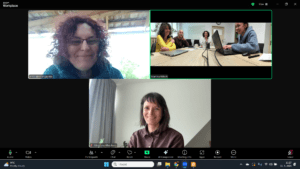
On Tuesday, May 13, 2025, a working meeting of the RONARO IESA SAS team was held at the Institute of Ethnology and Social Anthropology of the Slovak Academy of Sciences. The meeting was attended by Martina Wilsch, Soňa G. Lutherová, Ľubica Voľanská, and Miroslava Hlinčíková.
The main focus of the meeting was the organizational preparation of three expert workshops planned for the first year of the APVV project implementation. These workshops will involve external experts specializing in participatory methods as well as representatives from the Centre for Care, Sheffield University. A separate item on the agenda was a discussion on selected methodological aspects of the research design proposed by the team members and on ways to incorporate participatory elements into these designs.
Photo: RONARO research team at IESA SAS (M. Wilsch)
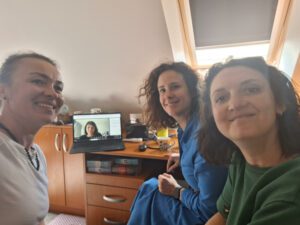
On March 28, 2025, the first and introductory online kick-off meeting of the RONARO project team was held, involving members from the Institute of Ethnology and Social Anthropology of the Slovak Academy of Sciences (ÚESA SAV, v. v. i.) as well as the Institute for Research in Social Communication of the Slovak Academy of Sciences (ÚVSK SAV, v. v. i.). The aim of this meeting was to successfully launch the project and lay a solid foundation for its future implementation.
Meeting Agenda:
- Presentation of the project and its objectives – Participants were introduced to the main focus of the project, its significance, and the expected outcomes.
- Presentation of the timeline and tasks – A detailed time schedule with key milestones was presented, and responsibilities were distributed among the team members.
- Clarification of expectations and competences of team members – The discussion addressed the responsibilities and expectations for individual roles, ensuring clarity and transparency.
- Establishing a shared understanding of the work process – Basic methodological frameworks and standards to be applied during the project implementation were agreed upon.
- Presentation of planned activities for the near future – Participants were provided with an overview of the upcoming steps and activities scheduled for the initial months of the project.
This kick-off meeting represented an important step toward the successful implementation of the project, setting the fundamental pillars for effective teamwork and the joint achievement of project goals.
Ongoing Outputs and Results of the Project
2026
On Wednesday, 11 February 2026, an expert workshop entitled ‘The Current Situation of Refugees from Ukraine in Slovakia’ was held, focusing on the contemporary circumstances shaping the lives of refugees from Ukraine in Slovakia.
The invitation to participate as expert speakers was accepted by Miroslava Mittlemannová, Director of the non-governmental organisation Human Rights League, and Ganna Shvachka, Director of the non-governmental organisation SME Spolu. Together with the RONARO team, represented by M. Wilsch, M. Hlinčíková, Z. Očenášová and M. Popper, they discussed key contextual factors and challenges faced by people from Ukraine living in Slovakia. These insights will subsequently be incorporated into the project’s research strategies and methodological approaches.
Photo 1: Presentation by M. Mittelmannová (M. Wilsch)
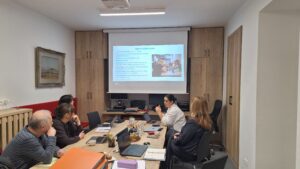
Picture 2: Expert workshop participants (A. Kalivodová)
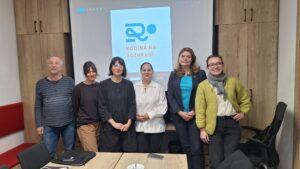
2025
IRSC SAS in cooperation with the RONARO project, organised an expert seminar entitled “Participatory and Co-Creative Methodologies with Older Adults” on 24 November 2025. The seminar was led by Dr Anna Wanka from Goethe University Frankfurt and Prof. Anna Urbaniak from Jagiellonian University in Kraków.
The seminar focused on participatory and co-creative methodologies in research with older adults, highlighting how these approaches foster mutual learning, challenge traditional power relations in research, and ensure that older people’s lived experiences shape research questions, methods, and outcomes. The speakers also addressed methodological innovations, ethical considerations, and the broader societal significance of involving older adults as equal research partners rather than merely as objects of study.
More information about the event is available HERE.
A recording of the seminar can be viewed HERE on the YouTube channel of IRSC SAS.
Martina Wilsch spoke on 4 November 2025 together with Prof. Ute Karl at the international expert workshop Ukrainian Forced Migration, Transnational Family Processes and Co-Agency, presenting the paper Care and Social Support Dynamics among Displaced Ukrainian Refugees: Reflections from Germany and Slovakia. The event was organised by CASTLE, Babeș-Bolyai University, Cluj-Napoca, Romania.
On 29 October 2025, the international expert seminar Transnational Families through the Lens of Participatory Research II was held online. The event featured invited experts from the Centre for Care at the University of Sheffield, United Kingdom — Professor Majella Kilkey and Myra Mufti — representing a partner institution collaborating on the RONARO project.
Their contributions addressed selected aspects of participatory research in the context of transnational families and care. In her lecture, Professor Kilkey discussed the role and potential of participatory research in migration studies, with particular attention to research on transnational families, and presented insights drawn from selected research projects. She devoted special attention to collaboration with community researchers, highlighting specific practical experiences, benefits, and challenges associated with this approach.
Myra Mufti introduced the potential of art-based participatory methods, focusing on their application in research on care within transnational families.
The closing part of the seminar was dedicated to a discussion session, in which members of the RONARO team explored not only general questions of participatory research but also specific topics and issues related to their own methodological designs.
The seminar was attended by all members of the RONARO research team: Martina Wilsch, Ľubica Voľanská, Miroslava Hlinčíková, Soňa G. Lutherová, Miroslav Popper, Magdaléna Petrjánošová, and Zuzana Očenášová.
Picture. 1: Discussion following the presentation by Majella Kilkey
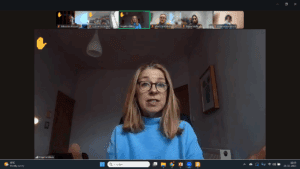
Picture 2: Presentation by Myra Mufti
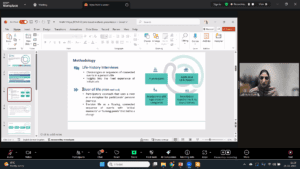
Picture 3: Discussion on the Presentations – Miroslav Popper
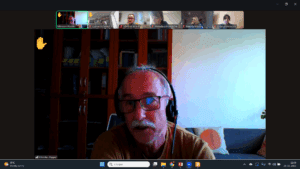
Miroslava Hlinčíková presented at the international conference 19th European Research Conference on Homelessness, which took place from September 18 to 19, 2025, in Utrecht. Her lecture, titled Housing as a Critical Precondition for Stability: Ukrainian Refugees in Slovakia, focused on aspects of housing among Ukrainian refugee families in Slovakia.
As part of the RONARO project, a professional workshop led by Anna Urbaniak, entitled Ethics of Participation: Respecting Voices, Power Dynamics, and Consent in Participatory Research, was held as part of the event ParticipAge! Exploring Participatory Approaches in Ageing Studies on 11 September 2025, between 9:30 and 13:00.
The event was jointly organised by the Institute of Ethnology and Social Anthropology of the Slovak Academy of Sciences, the EASA Age and Generations Network (AGENET), and the IUAES Commission on Aging and the Life Course.
The thematic session devoted to the ethical aspects of participatory research was co-organised within the framework of the RONARO project. Read more HERE.
On Wednesday, September 10, 2025, the international expert seminar Transnational Families through the Lens of Participatory Research took place at the premises of the Institute of Ethnology and Social Anthropology of the Slovak Academy of Sciences. The event hosted invited experts Prof. Ute Karl (Protestant University of Applied Sciences, Ludwigsburg) and Prof. Anna Urbaniak (Department of Sociology, Jagiellonian University), who delivered presentations focused on participatory approaches to researching transnational families and on broader questions of participatory methodology.
The one-day event provided space not only for the presentation of scholarly contributions but also for discussion among the research team regarding proposed methodological designs within specific thematic clusters. Special attention was devoted to methodological issues with the aim of refining research procedures within the RONARO project. All members of the broader research team participated in the workshop.
The main goal of the seminar was to further elaborate the research designs and to deepen the participatory component of the project.
Photo 1: Workshop (M. Wilsch)
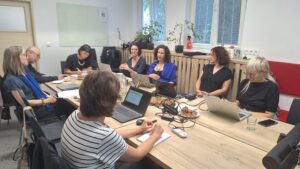
Photo 2: Presentation by Ute Karl (M. Wilsch)
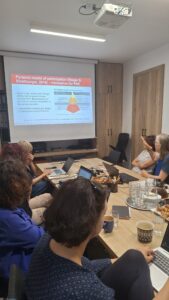
Photo 3: Presentation by Anna Urbaniak (M. Wilsch)
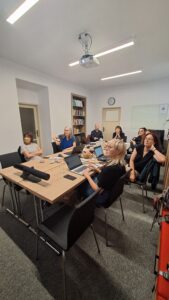
Photo 4: Workshop – discussion (M. Wilsch)
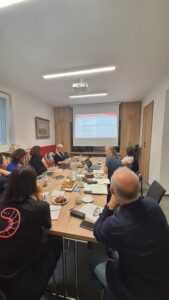
The Institute of Ethnology and Social Anthropology of the Slovak Academy of Sciences, in collaboration with the APVV VV-MVP-24-0203 project Family on the Edge: Current Contexts of Vulnerability and Transnational Family Transformations (RONARO), is co-organising an international seminar on participatory approaches in ageing research entitled Introduction to the Routledge International Handbook of Participatory Approaches in Ageing Research, to be led by Anna Urbaniak and Anna Wanka. The seminar will take place in person (conference room IESA SAS, Klemensova 19, Bratislava) and online on Tuesday, 9 September 2025, from 3:00 to 5:00 p.m.
The event is aimed at the wider academic and professional community interested in participatory research approaches. This international workshop is part of the broader event ParticipAge! Exploring Participatory Approaches in Ageing Studies, organised by the EASA Age and Generations Network (AGENET), the IUAES Commission of Aging and the Life Course, and the Institute of Ethnology and Social Anthropology of the Slovak Academy of Sciences. The event is also inspired by the initiative COST Action CA22167: Participatory Approaches with Older Adults (PAAR-net), in which our colleague Ľubica Voľanská, a member of the RONARO project team and co-convener of the EASA Age and Generations Network (AGENET), is actively involved.
More information about the event is available here.
Ľubica Voľanská delivered a keynote lecture at the international seminar on intangible cultural heritage in Kaustinen, Finland, held on July 12, 2025. The event, titled Music on the Move – Migration, Resilience and Identity, took place as part of the Kaustinen ICH Academy program and the 57th edition of the Kaustinen Folk Music Festival, whose main theme was migration.
She presented the keynote lecture Where Migration Studies Meet Living Heritage: Community Building among Ukrainian Refugees in Slovakia, co-authored with Martina Wilsch. In the lecture, they shared findings from research conducted with the Ukrainian community in Slovakia and highlighted the significance of living heritage in the context of migration. The lecture was partially prepared within the framework of the RONARO project and reflects its research focus.
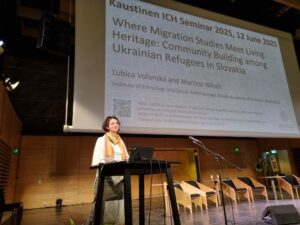
Martina Wilsch presented at the 22nd IMISCOE Annual Conference – Decentering Migration Studies in Paris on 4 July 2025 with a lecture titled “Housing as a Critical Precondition for Stability: Ukrainian Refugees in Slovakia,” prepared jointly with Miroslava Hlinčíková.
Martina Wilsch gave a keynote speech on June 26, 2025, at the international conference in Sofia, titled “Dynamics of Transnational Families in the Context of Armed Conflicts and Sociopolitical Crises,” organized by the Institute of Ethnology and Folklore Studies with the Ethnographic Museum at the Bulgarian Academy of Sciences. Her keynote speech was on the topic Transnational Care Practices of Ukrainian Refugee Families in Slovakia.
The contribution was prepared within the framework of the RONARO project and focused on the role and forms of transnational care in the lives of Ukrainian refugee families in Slovakia, from the theoretical perspective of social reproduction, critical care studies, and the moral economy of care.
The special issue is collectively organized by COST Action CA21143 Transnational Family Dynamics in Europe (TraFaDy) and also supported by the APVV project VV-MVP-24-0203 Family on the Edge: Current Contexts of Vulnerability and Transnational Family Transformations.
Guest editors:
Esra Demirkol Colosio (ORCID: 0000-0003-2349-2389), Sociology Department at Çankırı Karatekin University, Turkey
Jelena Predojević-Despić (ORCID: 0000-0002-3947-9974), Institute of Social Sciences, Serbia
Martina Wilsch (ORCID: 0000-0002-6502-5503), Institute of Ethnology and Social Anthropology, Slovak Academy of Sciences, Slovakia
Special issue of Slovak Ethnology critically examines the challenges of conducting qualitative research on transnational families and invites authors to methodologically contribute to the topic by addressing various aspects of this relationship, including the needs of research subjects, researchers’ subjectivities, research ethics, the positionality of researchers, and the specific research contexts surrounding transnational families, while also calling for innovative methodological contributions.
Deadline for abstract submissions is June 30, 2025. The final manuscripts will be expected no later than January 31, 2026.
Read all details about Special Issue HERE.
On 24 April 2025, an international methodological expert workshop entitled Beyond Translation: Reflexivity, Ethics, and the Role of Interpreters in Migration Research was held within the framework of the project RONARO – Family at the Crossroads: Contemporary Contexts of Vulnerability and Transformations of the Transnational Family. The event was organised by Mgr. Martina Wilsch, PhD, the principal investigator of the project.
The aim of the workshop was to critically examine the complexity of research involving interpreters in the study of transnational families. Through interactive and experiential methods, the workshop guided project team members as well as other participants towards a deeper understanding of ethical, reflexive, and contextually sensitive approaches to working with interpreters. At the same time, it contributed to the strengthening of the methodological skills of researchers focusing on transnational families.
The workshop addressed not only the methodological implications of involving interpreters in qualitative research, but also highlighted ethical dilemmas and the imperative of reflexivity. The event brought together 22 researchers from various European countries, all actively engaged in research on transnational families. The workshop was expertly led by Mgr. Helena Tužinská, PhD, a cultural and linguistic anthropologist from the Department of Archaeology and Cultural Anthropology at Comenius University, specialising in interpretation in migration research and institutional procedures (including asylum proceedings).
Participants were introduced to key theoretical and practical perspectives on interpretation in research, including:
- interlingual, intralingual, and intersemiotic dimensions of interpretation (Jakobson, 1959),
- narrative regimes and their influence on meaning-making in research (Spotti, 2019),
- the interpreter’s impact on data transmission and the positionality of the researcher,
- the role of interpreters as co-creators of cultural meaning, rather than passive intermediaries,
- ethical dilemmas, power dynamics, and the phenomenon of “interpreter invisibility” in the research process,
- strategies of dialogical communication and cultural mediation to uphold research integrity.
The structure of the workshop consisted of two 60-minute participatory sessions, including practical activities, discussions, and case study analyses, followed by a concluding lecture. The afternoon session was dedicated to an interactive methodological reflection on participants’ own research, as well as a discussion of opportunities for further collaboration.
Participants took away from the workshop:
- a deeper understanding of the methodological challenges of interpreter-mediated research,
- a reflexive awareness of their own positionality, power relations, and cultural interpretation in research interactions,
- skills for effective collaboration with interpreters,
- an appreciation of the active role of interpreters as co-creators of knowledge,
- a critical analysis of their own ethical principles in research.
The workshop provided a unique platform for critical discussion, networking activities, practical learning, and ethical reflection on the role of interpreters in qualitative research on transnational families. It also enhanced the methodological capacity of the RONARO project team in preparing the project’s research methodology.
The event was held in collaboration with COST Action CA21143 Transnational Family Dynamics in Europe and its Working Group on Qualitative Research (WG5Qual), co-led by Mgr. Martina Wilsch, PhD, and Esra Dermikol Colosio (Sociology Department, Çankırı Karatekin University).
Pictures from the workshop
Picture 1: Participatory Workshop (M. Wilsch)
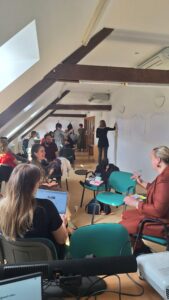
Picture 2: Lecture H. Tužinská (M. Wilsch)
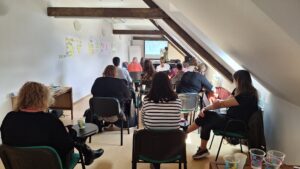
Picture 3: Discussions (M. Wilsch)
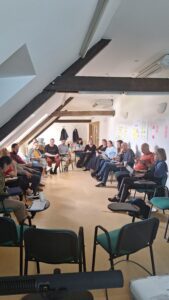
Picture 4: Participants of the workshop (H. Tužinská)
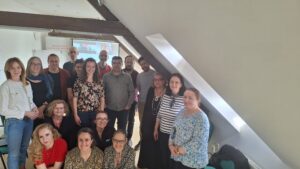
The RONARO Project – Family on the Edge: Contemporary Contexts of Vulnerability and Transformations of the Transnational Family has its own logo!
